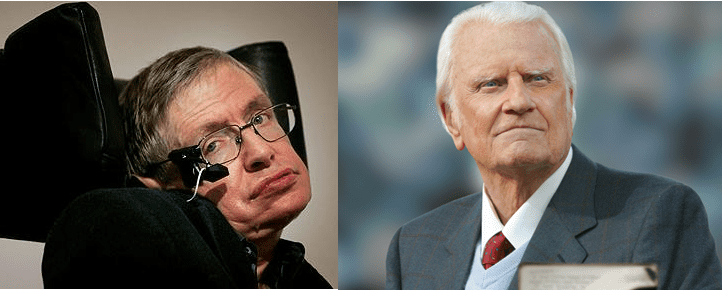
Physicist Stephen Hawking died March 14 at the age of 76. Millions grieved the passing of the brilliant scientist and bestselling author (his book A Brief History of Time: From the Big Bang to Black Holes, sold more than 10 million copies), who became perhaps the greatest scientific celebrity since Albert Einstein. His death, many noted, came on Pi Day.
Just weeks earlier, the world saw the passing of another cultural titan—that of the legendary evangelist Billy Graham, who died Feb. 21 at the age of 99.
On the surface, the two had very little in common. Hawking was stricken with ALS when he was 22, and he survived perhaps longer than anyone else ever has with the disease. He was an unmistakable figure in his wheelchair. Unable to speak or hardly move, he communicated via an infrared switch that detected subtle movements he made with his cheek. He was an admitted atheist.
Graham was no atheist, of course: For many, he embodied lifelong service to a living God, and folks heard that God through Graham’s booming voice. In his youth he was an arresting figure—tall (6-foot-2), handsome and blessed with a gift for oratory. “You have a voice that pulls,” Bob Jones Sr. once told him when Graham was nearly expelled from Bob Jones College. “God can use that voice of yours. He can use it mightily.”
But they did share two things.
One was a knack for leveraging the media and pop culture to spread their particular messages. Graham’s famous crusades, many of them televised, drew millions, along with the attention of secular print magazines and television stations. He founded the Christianity Today magazine, wrote 33 books and received a star on the Hollywood Walk of Fame—the only acting minister to receive the honor. Hawking, in addition to his bestseller, guest starred on everything from Star Trek to The Simpsons. His celebrity was cemented when The Theory of Everything, a movie focusing on his early life, was released in 2014. It was nominated for five Oscars (including one for Best Picture) and earned Eddie Redmayne a statuette as Best Actor. (“Unfortunately, Eddie did not inherit my good looks,” Hawking later quipped.)
But both, in their own ways, were deeply, vocationally concerned with the meaning of life and the universe.
“My goal is simple,” Hawking said, as quoted in The New York Times. “It is a complete understanding of the universe, why it is as it is and why it exists at all.” Hawking used his understanding of physics to plumb the mysterious fabric of the cosmos and pull at its threads.
“There is a language in nature that speaks of the existence of God,” Graham was quoted as saying in the Charlotte Observer. “God speaks in the certainty and regularity of the seasons; in the precision of the movements of the sun, the moon, and the stars; in the regular coming of night and day; in the balance between man’s consumption of life-giving oxygen and its production by the plant life of the Earth; and even in the cry of a newborn child with its ever new demonstration of the miracle of life.”
Two men looked up at the stars and wondered what it all meant. One plumbed for answers in physics, the other in faith, and they came to very different conclusions.
But maybe those answers weren’t as incompatible as sometimes we imagine them to be.
Look, I’m obviously a Christian, and I spend a lot of time thinking about God and faith and how it connects with … well, everything, from the movies and television we watch to the people who watch them.
But I dig science, too. My wife’s a chemist. I love biology and physics, even if my brain’s not wired to understand them as well as some. I watch shows like The Walking Dead and The Alienist as part of my job, but when I’m off the clock, what do I flip on? More than likely, you’ll see me and my wife plunked in front of the television watching some sort of nature or science documentary.
Lots of people say that science and faith are incompatible, but I disagree. For me, their answers are akin to asking how a pan of lasagna gets baked.
One person might talk about the noodles and the cheese, about temperature and baking time, and how all these elements (and a dozen others) go into making a pan of lasagna.
Another person might say, simply, that grandma bakes it.
Both answers strike me as equally true. They simply look at the question from a different set of eyes—or whether we want to look at the inside or outside the oven.
The created universe, it seems to me, is an oven all its own. People like Hawking do laudable work at telling us what’s happening inside that oven.
But people like Graham peer farther—peek outside that oven door, past the creation and to the Creator. And that’s pretty laudable work, too.













